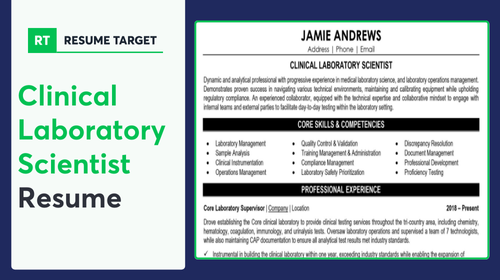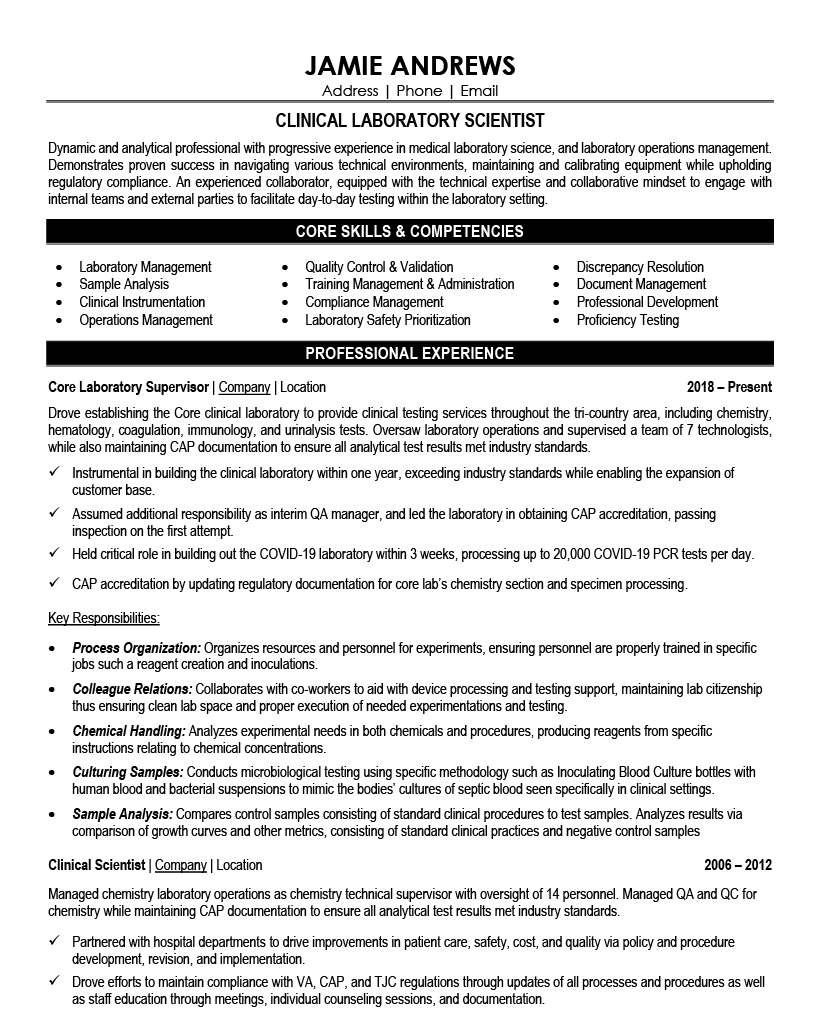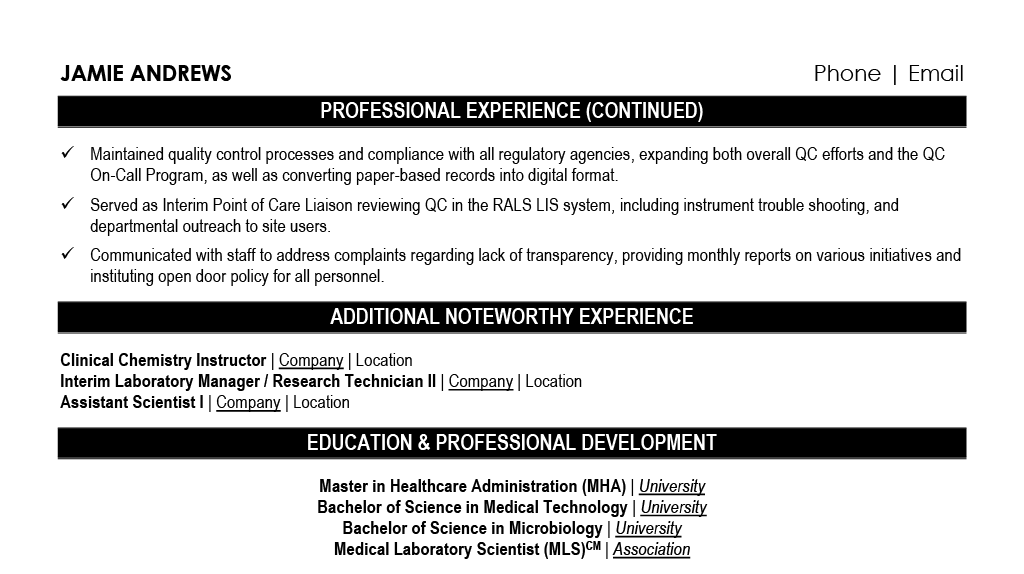

Translating complex lab procedures into compelling resume content stumps even the most skilled Clinical Laboratory Scientists. Your technical expertise deserves more than just a list of tests and equipment names.
Are you struggling to showcase both your analytical abilities and your impact on patient care? A well-crafted resume can transform your daily laboratory achievements into powerful proof of your professional value.
Resume Target specializes in helping Clinical Laboratory Scientists demonstrate their technical mastery and critical thinking skills. This guide will show you exactly how to create a resume that gets noticed by hiring managers and lands more interviews.


Behind every critical medical diagnosis, Clinical Laboratory Scientists serve as healthcare's hidden heroes, performing and analyzing over 70% of the laboratory tests that doctors use to make life-saving decisions.
These skilled professionals combine sophisticated technology with precise analytical methods to examine blood, tissue, and other biological samples, ensuring that every test result meets rigorous quality standards while providing crucial insights that help diagnose conditions ranging from diabetes to cancer.
If you're fascinated by both science and healthcare, a career as a Clinical Laboratory Scientist offers exciting opportunities to grow from entry-level testing to specialized roles in molecular diagnostics, laboratory management, or even groundbreaking research - let's explore how you can join this vital healthcare profession.
Let's talk about what's exciting in the Clinical Laboratory Scientist field - your earning potential varies significantly based on where you work, your expertise, and your specializations. And guess what? The opportunities for growth in this field are remarkable, especially if you're willing to explore different locations or develop specialized skills.
Figures from: AMN Healthcare
Clinical Laboratory Scientists can advance from entry-level technicians to laboratory directors through experience and education. Your career path offers multiple opportunities to specialize and lead while making a crucial impact in healthcare.
Beyond basic laboratory techniques, advancing in your Clinical Laboratory Scientist career requires a strategic blend of technical expertise and leadership capabilities.
- Advanced Laboratory Information Systems - Molecular Diagnostic Techniques - Quality Assurance and Control - Team Leadership and MentoringLaunch your Clinical Laboratory Scientist career by earning a bachelor's degree in medical laboratory science, completing clinical training, and obtaining state licensure to perform complex diagnostic testing.
To advance in this field, you'll need to develop key competencies including effective communication, which helps you collaborate with healthcare teams and accurately report critical findings.
Requirements from TrustedHealth
From bustling hospitals to diagnostic labs, CLS jobs span coast to coast with Texas and California leading the charge.
Figures from U.S. Bureau of Labor Statistics
Struggling to showcase your laboratory expertise, technical skills, and analytical achievements in a way that catches employers' attention? This comprehensive, section-by-section guide will help you create a Clinical Laboratory Scientist resume that effectively highlights your clinical testing proficiency, quality control experience, and laboratory management capabilities.
As a Clinical Laboratory Scientist, you know how to analyze complex data with precision, but condensing your professional story into a few powerful lines can feel more challenging than interpreting the most complex lab results.
While you excel at performing detailed testing procedures and ensuring accurate diagnostic results, translating these technical skills into compelling resume language that catches a hiring manager's attention requires a different kind of precision - one that showcases both your analytical expertise and your impact on patient care.
How would you characterize your expertise across different laboratory disciplines (clinical chemistry, hematology, microbiology, etc.) and what is your primary area of specialization that sets you apart in the field?
Reason: Opening with your scope of expertise immediately establishes your professional identity and helps hiring managers understand your technical foundation. This overview creates context for the rest of your summary.
What would you say is your most valuable contribution to laboratory operations beyond technical skills, such as quality management, regulatory compliance, or team leadership?
Reason: Laboratory directors look for scientists who bring value beyond basic technical competencies. Highlighting these broader contributions helps position you as a well-rounded laboratory professional.
How have you adapted to and implemented new laboratory technologies or methodologies throughout your career while maintaining accuracy and compliance standards?
Reason: The ability to evolve with advancing technology while maintaining quality standards is crucial in clinical laboratory science. This question helps articulate your adaptability and commitment to continuous improvement.
As a Clinical Laboratory Scientist, you need to showcase both your technical expertise in laboratory procedures and analytical methods, as well as your ability to handle day-to-day operational responsibilities like quality control and regulatory compliance.
Your skills section should highlight your proficiency with specialized laboratory equipment and information systems (like LIS and LIMS), while also emphasizing critical soft skills such as attention to detail, problem-solving abilities, and your capacity to work under pressure in a fast-paced clinical environment.
Showcase your laboratory expertise by organizing your experience into three powerful sections: a concise role overview highlighting your clinical setting, measurable achievements that demonstrate your diagnostic accuracy and efficiency, and core responsibilities that emphasize your technical proficiency and compliance record.
Many Clinical Laboratory Scientists struggle to translate their daily technical procedures and complex analytical work into compelling achievements that resonate with hiring managers. Transform your laboratory expertise into powerful success stories by connecting your precise testing protocols and quality control measures to improved patient outcomes, reduced turnaround times, and enhanced laboratory efficiency metrics.
A strong responsibilities section demonstrates how Clinical Laboratory Scientists contribute to patient care through precise diagnostic testing and analysis. Your role description should help non-technical hiring managers understand how your laboratory expertise directly impacts medical decisions and patient outcomes.
Your education and professional certifications are crucial validations of your expertise in clinical laboratory science. Start with your highest degree in medical technology or clinical laboratory science, then list your current certifications from recognized organizations like ASCP or AMT, making sure to include any specialized certifications in areas like molecular diagnostics or blood banking.
Now that you've built a strong foundation using Resume Target's expert guidelines for resume writing, you're ready to transform your CV into a powerful tool for landing your ideal laboratory position.
While many Clinical Laboratory Scientists make the mistake of using the same resume for every application, successful candidates know that personalizing their credentials and experience for each specific role is essential for standing out in this competitive field.
By strategically customizing your resume with relevant laboratory techniques, equipment expertise, and certification keywords, you'll not only clear ATS screening systems but also demonstrate to hiring managers that you're precisely the laboratory professional they're seeking.
Ready to turn your resume into a precision instrument for success? Let's optimize your Clinical Laboratory Scientist credentials to perfectly match each opportunity!
Don't let a lack of professional lab experience hold you back - your academic background and hands-on training can make an impressive Clinical Laboratory Scientist resume.
Instead of dwelling on unrelated work history, showcase your scientific education, laboratory skills, and clinical rotations or internships that demonstrate your expertise with testing procedures and equipment.
Focus on highlighting your technical proficiency, analytical capabilities, and attention to detail in laboratory procedures.
For more guidance on crafting your resume, check out the Student Resume Writing Guide to ensure you're including all the essential elements employers look for.
Your laboratory experience during clinical rotations and academic projects can form the foundation of a compelling professional summary that showcases your technical expertise and analytical capabilities.
Focus on highlighting your hands-on laboratory skills, knowledge of testing procedures, and any specialized certifications or training you've completed to demonstrate your readiness for the role.
"Detail-oriented and methodical Clinical Laboratory Scientist with comprehensive academic training and 12 months of clinical rotation experience across hematology, chemistry, and microbiology departments. Demonstrated proficiency in performing complex laboratory tests, maintaining quality control protocols, and operating advanced diagnostic equipment. Skilled in LIMS software and CDC safety protocols, with proven accuracy in specimen handling and results reporting. Seeking to leverage strong analytical skills and medical technology expertise to contribute to a dynamic clinical laboratory setting."
Now's your chance to showcase the rigorous academic preparation that makes you a qualified Clinical Laboratory Scientist - from your core biology and chemistry foundations to specialized laboratory coursework!
Don't just list your degree - highlight relevant courses like Clinical Chemistry and Medical Microbiology, plus include impactful projects like your clinical rotations or research that demonstrate your hands-on laboratory expertise.
Courses common to a Clinical Laboratory Scientist degree/certification consist of various subjects related to laboratory sciences.Relevant Coursework: Clinical Chemistry | Hematology | Medical Microbiology | Immunology | Clinical Laboratory Techniques | Molecular Diagnostics
Key Projects:
Blood Bank Inventory Management System: Developed and implemented a comprehensive tracking system for blood products to optimize inventory control and reduce waste in university hospital laboratory setting.
Automated Hematology Analysis Protocol: Collaborated with cross-functional laboratory team to streamline blood sample processing workflow and enhance accuracy of results.
Leverage your academic training, laboratory coursework, and clinical rotations to showcase the precise technical and analytical abilities that healthcare employers seek in entry-level Clinical Laboratory Scientists.
As an aspiring Clinical Laboratory Scientist, your combination of technical expertise and attention to detail positions you perfectly for a rewarding career in clinical diagnostics, where the demand for qualified professionals continues to grow steadily.
Let's face it - translating your complex laboratory procedures, analytical methods, and technical expertise into language that both hiring managers and ATS systems can understand feels like trying to fit a microscope slide into a test tube.
At Resume Target, we specialize in crafting resumes for Clinical Laboratory Scientists that perfectly balance technical precision with clear business impact, helping professionals like you showcase everything from method validation to quality control initiatives.
Our proven track record includes helping hundreds of laboratory professionals transform their technical expertise into compelling career stories that resonate with both healthcare and research institutions.
With clinical laboratories evolving rapidly and new technologies emerging daily, you can't afford to let an outdated resume hold you back - connect with us today to ensure your expertise shines through in every application.
Impress any hiring manager with our Scientist resume writing service. We work with all career levels and types of Scientist professionals.
Learn More → Scientist Resume Writing Services